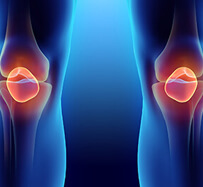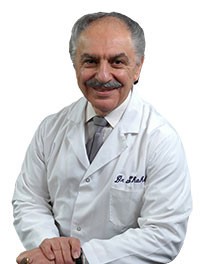Torn Meniscus Stem Cell Treatment in Wyckoff, NJ

Is your knee swollen, stiff, and slow to straighten? You may have torn your meniscus. That’s the C-shaped piece of cartilage that cushions your shinbone from your thighbone like a shock absorber and distributes weight across your knee joint. This very common knee injury has traditionally been treated with surgery to remove frayed cartilage and tissue, often leaving them vulnerable to further damage in the future.
Stem cells may target the root cause of your pain by stimulating your body to regenerate its own damaged cells.
Physicians have been using stem cell injections to regenerate the meniscuses of professional athletes for over 20 years. Introducing mesenchymal stem cells into torn cartilage may stimulate the patient’s own cells’ regenerative properties, helping to repair injury, relieve pain, and promote healthy new cell growth.
Don’t allow a torn meniscus to degenerate your knee stability and range of movement or develop into osteoarthritis. Speak with a regenerative medicine practitioner for a consultation in Wyckoff today at (201) 806-6099 or contact Dr. M. T. Shahab online.
What are the symptoms of a torn meniscus?
You’ll know your meniscus is probably torn when you consistently feel the following symptoms:
- swelling or stiffness
- a popping sensation
- pain, especially when twisting or rotating your knee
- difficulty straightening your knee fully
- knee locking with limited mobility
What can cause my meniscus to tear?
Whenever you suddenly and forcefully twist or rotate, aggressively pivot, or stop and turn your knee, you risk tearing your meniscus. Kneeling, deep squatting, or heavy lifting can also cause a tear. Athletes who play contact sports like football, basketball, tennis, soccer, or lacrosse, as well as runners who jog on uneven terrain, are at a higher risk for meniscus tear. The degenerative changes that come with aging can also cause a torn meniscus with little or no trauma.
According to the Journal of Orthopedic and Sports Physical Therapy, more than 850,000 meniscal tears are treated each year in the US, making it one of the most common athletic injuries. While surgery is typically used to repair these injuries, its failure rate is enough to discourage many patients from choosing it. Other treatments, like stem cell injection, may treat pain and immobility without the need for painful or risky surgery.
How is a torn meniscus diagnosed?
First, your provider will give you a physical exam and discuss your symptoms, medical history, and any medications you’re taking. Special attention will be given to your symptoms’ duration, severity, and intervals. Your provider will also examine the spot along your joint where your meniscus lies and test your range of motion.
Performing a McMurray test is a common and effective way of confirming or ruling out a medial or lateral meniscal tear. Your practitioner will ask you to lie down on an exam table and flex your knee as far as you can, then relax it. He or she will then grasp your ankle while palpating and rotating your lower leg internally and externally and extending the knee. If you hear a “click” while your knee is rotating and extending, you’ve likely torn your meniscus.
If these exams are inconclusive (potentially because of the size or position of the tear) magnetic resonance imaging (MRI) can produce detailed images of all your knee’s soft tissues and determine whether your damage extends beyond the meniscus.
How can stem cells treat a torn meniscus?
Injured cells in your skin, bones, muscles, ligaments, tendons, and connective joints send out signals. Stem cells respond to those signals, migrating to the injured tissue and release proteins that nourish and stimulate your own cells’ regeneration process.
Once your practitioner injects them, the stem cells dock next to your cells and release growth factors, cytokines, and chemokines which then may:
- activate T-cells to secrete proteins
- open your blood vessels and form new ones
- move cells out of your blood vessels and into the tissues surrounding them
- stimulate your cells to regenerate your tissue
- inhibit your inflammation
- regulate your immune system
Where do these live stem cells come from?
We process the umbilical cord blood of healthy newborns. If a pregnant woman is not planning to keep her unborn child’s umbilical cord, she may choose to donate it. She’ll be asked to sign an informed consent form, followed by medical and social history reviews, as well as a blood test.
After a new mother meets all donor eligibility requirements and safely delivers her baby, the umbilical cord blood is collected in a sterile cord blood collection pouch and sent to a lab. The cord blood is processed within 48 hours using proprietary methods. A sample of the finished product is tested by an independent third party lab for sterility. The umbilical cord stem cells are distributed once the lab reports have passed mandatory regulatory requirements.
Are umbilical cord stem cells FDA approved?
The FDA recently confirmed there is only one registered and approved stem cell product on the market: umbilical cord blood-derived hematopoietic progenitor cells (blood forming stem cells) used for certain indications. While there is enormous promise in stem cell therapies, and thousands of ongoing experiments trying to establish efficacy, stem cell treatments do not yet meet the FDA’s scientific approval standard.
Practitioners tapping into this enormous promise of stem cells for any therapeutic use must exercise their professional judgment and expertise. We urge anyone embarking on the use of stem cell therapies to consult the national health data bases to evaluate current clinical trial information, and the FDA’s website on human tissue, to get its current therapy evaluations.
In 2018 the FDA’s commissioner and research director reported that the agency will be incorporating some “new concepts for how small investigators and firms can seek and meet the approval standard for products through efficient expedited pathways.” You can keep up with latest developments on the FDA’s website.
Is it normal to have an inflammatory response after my Injection?
It is not uncommon to have an inflammatory response after a stem cell injection. This is not because the body is rejecting the cells – it may actually be a positive sign that the live cells are working up a healing response.
The degree of inflammatory response to live-nucleated cells can vary based on:
- the levels of IL-6 within your joint or tissue
- the severity of damage and current inflammation in your joint
- PRP therapy in conjunction with stem cell injection increases the probability of inflammatory response
What is a common torn meniscus recovery time?
Usually pain relief begins immediately after treatment. Regeneration time varies depending on the severity of your injury and your ability to follow post treatment care, along with your rehabilitation program to strengthen affected areas.
What are the side effects of stem cell injections?
As with any injection procedure, there is a small risk of bacterial infection (not associated with the product) and nerve damage. If you experience severe pain, bleeding, or swelling at your injection site, or experience symptoms like fever, nausea, dizziness, or vomiting, seek emergency medical care right away.
Reserve your appointment today
A torn meniscus can cause intense pain, limping, and eventually, even osteoarthritis, which can dampen your enjoyment of life’s pleasures and adventures. Stem cell injection therapy may be able to help repair your tear, and reduce or eliminate your pain. To speak with a compassionate, highly trained stem cell injection specialist in Wyckoff today, call (201) 806-6099 or contact Dr. M. T. Shahab online.
MedWell Non Surgical Orthopedic Stem Cell & Regenerative Therapy Center
Address
33 Central AvenueMidland Park, NJ 07432
(201) 806-6099
www.BergenCountyDoctors.com
Hours
Mon:
8:00 am - 6:30 pm
Tue:
2:00 pm - 6:30 pm
Wed:
8:00 am - 6:30 pm
Thu:
9:00 am - 1:00 pm
Fri:
8:00 am - 6:30 pm
Sat:
9:00 am - 1:00 pm
Sun:
By Appointment Only




